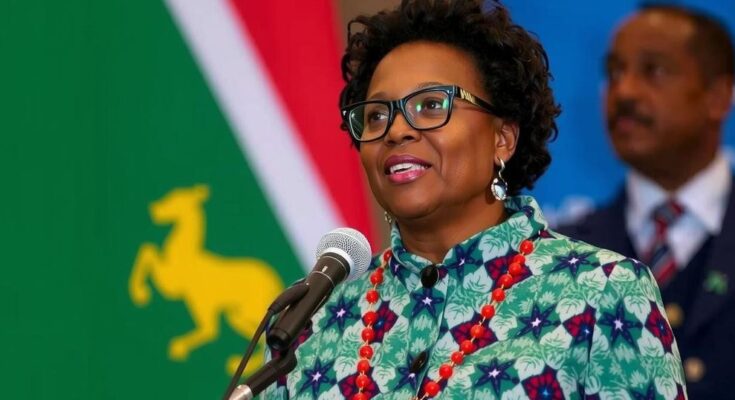Namibia has elected its first female president, Netumbo Nandi-Ndaitwah, who won 57% of the vote, extending the ruling Swapo party’s power. The election was marred by controversy, with opposition parties contesting the results due to technical issues. Nandi-Ndaitwah’s win contrasts with trends seen in neighboring nations where liberation movements lost ground to younger voters seeking change.
Namibia has achieved a historic milestone by electing its first female president, Netumbo Nandi-Ndaitwah, who secured victory in the recent presidential elections. With 57% of the vote, she has successfully extended the ruling Swapo party’s dominance, which has been in power for 34 years since Namibia’s independence from apartheid South Africa in 1990. Following the announcement of the official results, Nandi-Ndaitwah, aged 72, expressed, “The Namibian nation has voted for peace and stability.”
Nandi-Ndaitwah’s rise to the presidency comes on the heels of her appointment as vice-president earlier this year after the death of President Hage Geingob while in office. Despite her victory, the election faced significant controversy; opposition parties have contested the results, citing operational challenges such as ballot paper shortages and claiming that the extension of the voting period was illegal.
The second position in the election was claimed by Panduleni Itula, who garnered 25.5% of the votes, representing a decrease from his performance in 2019. Moreover, while the Swapo party received a majority of 53% of the parliamentary vote, this reflects a noticeable decline from 65% in the previous election. Nandi-Ndaitwah’s leadership stands out as she is regarded as a seasoned diplomat not associated with the corruption issues that have plagued other Swapo officials. Her victory is particularly significant as it contrasts with the trend in Southern Africa, where liberation movements have faced backlash from younger voters.
This recent election continues a complex narrative within the region, wherein historically dominant parties navigate growing dissatisfaction among younger demographics, as evidenced by noteworthy electoral shifts in South Africa and Botswana.
The political landscape in Namibia has been dominated by the Swapo party since its independence from South African rule in 1990. The election of Netumbo Nandi-Ndaitwah represents not only a historic change in leadership but also a pivotal moment for gender representation in Namibian politics. As the first woman to lead the country, Nandi-Ndaitwah’s presidency could reshape perceptions regarding female leadership in a region traditionally governed by male politicians. Furthermore, the electoral outcomes have reignited discussions about the challenges incumbent parties face in maintaining popularity amid shifting public sentiments and demands for accountability.
The election of Netumbo Nandi-Ndaitwah as Namibia’s first female president marks a significant milestone in the nation’s political history, confirming Swapo’s extended hold on power despite controversies surrounding the election. Nandi-Ndaitwah’s win amidst technical difficulties highlights ongoing tensions between the government and opposition parties. The contrasting outcomes within the region reflect a broader shift in voter sentiments that may influence future elections in Africa, as younger populations increasingly demand accountability and reform from long-standing leaderships.
Original Source: www.theguardian.com




